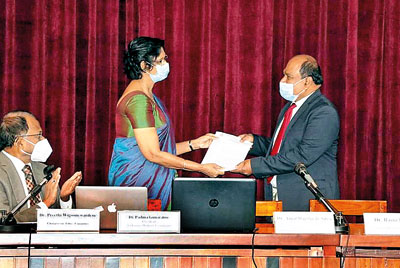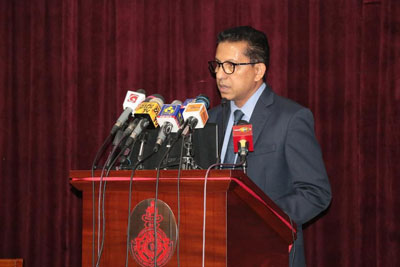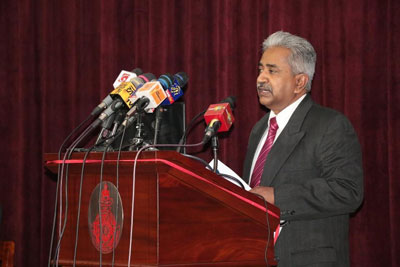News
SLMA urges setting up ethics committee on COVID-19

SLMA President Dr. Padma Gunaratne hands over the letter requesting the setting up of a National Ethics Committee on COVID-19 to State Ministry Secretary Dr. Amal Harsha de Silva, with Dr. Preethi Wijegoonewardena looking on
Urging the setting up of a National Ethics Committee on COVID-19, the Sri Lanka Medical Association (SLMA), the apex body of medical professionals in the country, on Wednesday handed over a letter to health officials.
It followed a two-hour symposium on ‘Ethics in COVID-19’ organized by the SLMA’s Expert Committee on Ethics where important issues were debated. The letter was handed over to State Ministry of Primary Health Services, Pandemics & COVID-19 Prevention Secretary, Dr. Amal Harsha de Silva.
The symposium was chaired by SLMA President Dr. Padma Gunaratne and Dr. Preethi Wijegoonewardena (Chairperson of the Ethics Committee), with Dr. Surantha Perera (Secretary of the Ethics Committee) and Dr. Vinya Ariyaratne as co-facilitators.
Setting the tone, Dr. Padma Gunaratne reiterated that medical ethics stand on four strong pillars – non-maleficence, beneficence, justice andautonomy.
Echoing the need for strong ethics, Dr. Surantha Perera pointed out that the global ethics community is working together to address the ethical implications of the COVID-19 pandemic, from resource allocation and priority-setting, physical distancing, public health surveillance, health-care workers’ rights and obligations to conduct of clinical trials, which presentserious ethical challenges.
“There is a great need for guidance to ensure proper decision-making,” he said, adding that a National Ethics Committee on COVID-19 is needed in Sri Lanka to assist in control measures, data collection, initiating research, resource allocation and policy development.

At the symposium (from left): Prof. Athula Sumathipala, Dr. Vinya Ariyaratne, Dr. Deepa Gamage, Ms Ritsu Nacken, Dr. Preethi Wijegoonewardena, Dr. Padma Gunaratne, Dr. Amal Harsha de Silva, Dr. Razia Pendse and Dr. Surantha Perera.
“Are we concerned about Ethics in COVID-19,” was the question by Dr. Vinya Ariyaratne who said that ethics are the “moral principles that govern a person’s behaviour or the conducting of an activity”.
“Ethical considerations in COVID-19 are complex and are also determined by the ‘pre-COVID’ status of the practice of ethics in the health system and society in general. There is a need for an honest and evidence-based appraisal of the situation; thus far which has not received much attention,” he said.

Dr. Surantha Perera
Looking at the current status in Sri Lanka, Dr. Ariyaratne said that aspects of the medical/public health standpoint which need to be considered include Public Health Policy; the quarantine process (policy, transparency, quality of care); testing; contact tracing; stigmatizing affected individuals, contacts and those on quarantine; violation of privacy and confidentiality (vis-à-vis the quarantine law); treatment/patient care; management of the dead; normal functioning of routine preventive and curative health services and vaccine-related (equity and social justice) issues.
He said that from a social standpoint, they include media reporting/coverage and social media; misinformation/disinformation; stigma and discrimination; lockdowns – differential impact on communities; cost of preventive measures; and impact on vulnerable groups (children – abuse at home due to closure of schools, women – gender-based violence, differently-abled, elderly, patients on treatment for chronic diseases including mental illness, residents of care homes, prisoners and migrant workers – particularly women including returning migrants).
His plea was that even though ‘Ethics in COVID-19’ extends beyond the realm of public health practice, clinical care and research, the medical community bears the primary responsibility to give leadership to address ethical issues.
The WHO’s Country Representative Dr. Razia Pendse spoke on the need for equitable resource allocation and not just financial resources but also human resources and medical products.

Dr. Vinya Ariyaratne
“These days we are hearing a lot about vaccine nationalism and equitable access to vaccines,” she said.
United Nations Population Fund (UNFPA) Country Representative Ritsu Nacken pointed out that the pandemic has brought to light the structural and long-standing discrimination and inequality on a gender basis. A majority of healthcare workers are women and in many countries essential workers such as cleaners, those who work in supermarkets or the pharmacies, are also often women.
“A lot of services moved from physical to virtual services and there are people who don’t have access to technology, very often more women are in this category,” she said, also highlighting the unseen aspect of access to reproductive health services.
Ms. Nacken urged that “we really need to listen to the woman’s voice……particularly those with a disability, migrant women and other women who are in more precarious situations”.
Consultant Epidemiologist Dr. Deepa Gamage said it is important to consider personal interest whether to accept the vaccine or not and the personal requirement to get the vaccine versus the country requirement of the greater population.
“If we don’t have the ability to give equal vaccinations to everybody, then we have to identify the vulnerable population and how to consider the public health requirement to prevent the transmission or to protect the most vulnerable,” she added.
Prof. Athula Sumathipala, a Psychiatrist, meanwhile, said that he is a strong believer in research but at the same time the other side of the coin is ethics. You can observe ethics while doing good research which is hugely needed and there are golden rules.
“We must never compromise on ethical obligations even at gunpoint,” he stressed.


